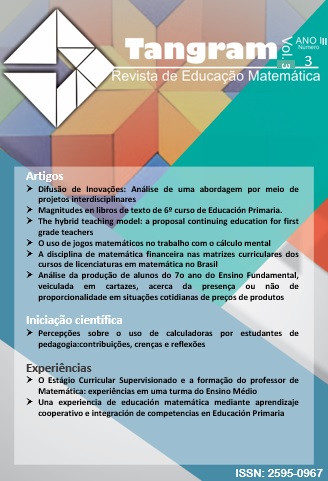The Supervised Internship and the formation of the Mathematics teacher: experiences in a high school class
DOI:
https://doi.org/10.30612/tangram.v3i3.11291Keywords:
Supervised internship. Experiences. Mathematics teaching.Abstract
This article aims to report and reflect on the experiences lived during the Supervised Internship IV, of the Mathematics Degree course at the State University of Bahia -UNEB, CampusVII -Senhor do Bonfim. The same was done during the first semester of 2019 and sought to insert the licensee in the teaching space in Mathematics, in high school classes, so that they could experience situations that in the future may be found in the workspace. For this, the following activities were carried out: i) approaching the school reality through reading the Political Pedagogical Project, observing the school space and building an intervention project; ii) teaching in a high school class and iii) proposing a workshop. It is worth mentioning that the immersion movement at school promoted the development of knowledge necessary for the exercise of teaching and contributed to the process of constituting the teaching identity.Downloads
References
Base Nacional Comum Curricular. (2018). Ministério da Educação. Brasília. Recuperado em 01 julho, 2020, de http://basenacionalcomum.mec.gov.br/.
Orientações Curriculares para o Ensino Médio. (2006). Brasília. Recuperado em 01 julho, 2020, de http://portal.mec.gov.br/seb/arquivos/pdf/book_volume_02_internet.pdf.
Costa, M. S.; Allevato, N. S. G. (2015). Proporcionalidade e função afim: uma possível conexão através da resolução de problemas. XIV Conferência Interamericana de Educação Matemática. Chiapas, México.
Dante, L. R. (2016). Matemática: contexto e aplicações: Ensino Médio (3a ed). São Paulo: Ática.
Gatti, B. (2010). Formação de professores no Brasil: características e problemas. Educação e Sociedade, 31 (113), pp. 1355-1379. Recuperado em 01 julho, 2020, de https://www.scielo.br/pdf/es/v31n113/16.pdf.
Gatti, B. A. Barreto, E. S. S. André, M. E. D. A. Almeida, P. C. A. (2019). Professores do Brasil: novos cenários de formação. Brasília: UNESCO.
Luckesi, C. C. (1997). Avaliação da aprendizagem Escolar, (6a ed). São Paulo: Cortez.
Pacheco, M. A. T. Pinto, L. R. Petroski, F. B. (2015). O uso do celular como ferramenta pedagógica: uma experiência válida. XIII Congresso Nacional de Educação Recuperado em 01 julho, 2020, de https://educere.bruc.com.br/arquivo/pdf2017/24549_12672.pdf.
Pereira, E. E. Souza, G. B. Cunha, R. G. Silva, V. S. F. Esteves, F. G. Pereira, P. C. S. (2016). Criptografia de dados utilizando matrizes. Revista Unifenas. 11 (1), pp. 1-9, Recuperado em 01 julho, 2020, de http://revistas.unifenas.br/index.php/RE3C/article/view/100/64.
Pimenta, S. G.; Lima, M. S. L. (2006). Estágio e docência: diferentes concepções. Revista Poíesis, 3 (3), pp. 5-24, Recuperado em 01 julho, 2020, de https://www.revistas.ufg.br/poiesis/article/view/10542.
Pimenta, Selma Garrido. (2004). Estágio e docência. São Paulo: Cortez.
Ponte, J. P. (2002). A vertente profissional da formação inicial de professores de Matemática. Educação Matemática em Revista. 9 (11), pp. 3-8, Recuperado em 01 julho, 2020, de http://www.educ.fc.ul.pt/docentes/jponte/docs-pt/02-Ponte%20(SBEM).pdf
Santos, G. L.; Vieira, A. R. L. (2019). Conexões entre conteúdos matemáticos: perspectiva para uma aprendizagem significativa. XIII Encontro Nacional de Educação Matemática. Recuperado em 01 julho, 2020, de https://www.sbemmatogrosso.com.br/eventos/index.php/enem/2019/paper/view/2153
Scalabrin, I. C.; Milionari, A. M. C. (2013). A importância da prática do estágio supervisionado nas licenciaturas. Revista Unar, 7 (1), pp. 1-12, Recuperado em 01 julho, 2020, de http://revistaunar.com.br/cientifica/documentos/vol7_n1_2013/3_a_importancia_da_pratica_estagio.pdf
Silva, A. J. N. Souza, I. S. Barros, S. S. ALMEIDA, J. (2014) O professor de Matemática e o Ato de Planejar: Há Unicidade entre dimensão política e dimensão pedagógica. Jundiaí: Paco Editorial.
Shulman, L. S. (2005). Conocimiento y enseñanza: fundamentos de la nueva reforma. Profesorado. Revista de Currículum y formación del profesorado, 9 (2), pp. 1-30, Recuperado em 01 julho, 2020, de https://www.ugr.es/~recfpro/rev92ART1.pdf
Vasconcellos, C. S. (2014). Planejamento: projeto de ensino-aprendizagem e projeto político-pedagógico. São Paulo: Libertad Editora.
Zinke, I. A.; Gomes, D. (2015). A prática de observação e a sua importância na formação do professor de geografia. XII Congresso Nacional de Educação. Recuperado em 01 julho, 2020, de https://educere.bruc.com.br/arquivo/pdf2015/18655_7820.pdf.
Downloads
Published
How to Cite
Issue
Section
License
Authors must accept the publication rules when submitting the journal, as well as agree to the following terms:
(a) The Editorial Board reserves the right to make changes to the Portuguese language in the originals to maintain the cultured standard of the language, while respecting the style of the authors.
(b) Authors retain the copyright and grant the journal the right to first publication, with the work simultaneously licensed under the Attribution-NonCommercial-ShareAlike 3.0 Brazil (CC BY-NC-SA 3.0 BR) that allows: Share - copy and redistribute the material in any medium or format and Adapt - remix, transform, and create from the material. CC BY-NC-SA 3.0 BR considers the following terms:
- Attribution - You must give the appropriate credit, provide a link to the license and indicate whether changes have been made. You must do so under any reasonable circumstances, but in no way that would suggest that the licensor supports you or your use.
- NonCommercial - You may not use the material for commercial purposes.
- Sharing - If you remix, transform, or create from material, you must distribute your contributions under the same license as the original.
- No additional restrictions - You may not apply legal terms or technological measures that legally restrict others from doing anything that the license permits.
(c) After publication, authors are allowed and encouraged to publish and distribute their work online - in institutional repositories, personal page, social network or other scientific dissemination sites, as long as the publication is not for commercial purposes.






